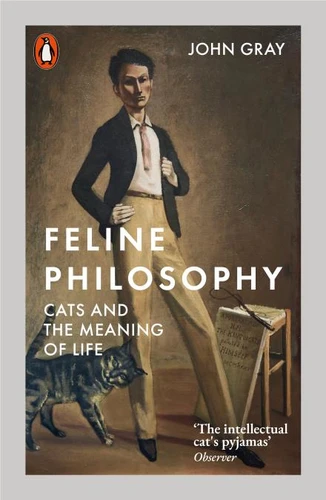Feline Philosophy. Cats and the Meaning of Life
Par :Formats :
Disponible dans votre compte client Decitre ou Furet du Nord dès validation de votre commande. Le format ePub protégé est :
- Compatible avec une lecture sur My Vivlio (smartphone, tablette, ordinateur)
- Compatible avec une lecture sur liseuses Vivlio
- Pour les liseuses autres que Vivlio, vous devez utiliser le logiciel Adobe Digital Edition. Non compatible avec la lecture sur les liseuses Kindle, Remarkable et Sony
- Non compatible avec un achat hors France métropolitaine
 , qui est-ce ?
, qui est-ce ?Notre partenaire de plateforme de lecture numérique où vous retrouverez l'ensemble de vos ebooks gratuitement
Pour en savoir plus sur nos ebooks, consultez notre aide en ligne ici
- Nombre de pages128
- FormatePub
- ISBN978-0-241-35115-4
- EAN9780241351154
- Date de parution29/10/2020
- Protection num.Adobe DRM
- Infos supplémentairesepub
- ÉditeurPENGUIN
Résumé
'Why can't a human be more like a cat? That is the question threaded through this vivid patchwork of philosophy, fiction, history and memoir ... a wonderful mixture of flippancy and profundity, astringency and tenderness, wit and lament' Jane O'Grady, Daily Telegraph'When I play with my cat, how do I know she is not passing time with me rather than I with her?' MontaigneThere is no real evidence that humans ever 'domesticated' cats.
Rather, it seems that at some point cats saw the potential value to themselves of humans. John Gray's wonderful new book is an attempt to get to grips with the philosophical and moral issues around the uniquely strange relationship between ourselves and these remarkable animals. Feline Philosophy draws on centuries of philosophy, from Montaigne to Schopenhauer, to explore the complex and intimate links that have defined how we react to and behave with this most unlikely 'pet'.
At the heart of the book is a sense of gratitude towards cats as perhaps the species that more than any other - in the essential loneliness of our position in the world - gives us a sense of our own animal nature.
Rather, it seems that at some point cats saw the potential value to themselves of humans. John Gray's wonderful new book is an attempt to get to grips with the philosophical and moral issues around the uniquely strange relationship between ourselves and these remarkable animals. Feline Philosophy draws on centuries of philosophy, from Montaigne to Schopenhauer, to explore the complex and intimate links that have defined how we react to and behave with this most unlikely 'pet'.
At the heart of the book is a sense of gratitude towards cats as perhaps the species that more than any other - in the essential loneliness of our position in the world - gives us a sense of our own animal nature.
'Why can't a human be more like a cat? That is the question threaded through this vivid patchwork of philosophy, fiction, history and memoir ... a wonderful mixture of flippancy and profundity, astringency and tenderness, wit and lament' Jane O'Grady, Daily Telegraph'When I play with my cat, how do I know she is not passing time with me rather than I with her?' MontaigneThere is no real evidence that humans ever 'domesticated' cats.
Rather, it seems that at some point cats saw the potential value to themselves of humans. John Gray's wonderful new book is an attempt to get to grips with the philosophical and moral issues around the uniquely strange relationship between ourselves and these remarkable animals. Feline Philosophy draws on centuries of philosophy, from Montaigne to Schopenhauer, to explore the complex and intimate links that have defined how we react to and behave with this most unlikely 'pet'.
At the heart of the book is a sense of gratitude towards cats as perhaps the species that more than any other - in the essential loneliness of our position in the world - gives us a sense of our own animal nature.
Rather, it seems that at some point cats saw the potential value to themselves of humans. John Gray's wonderful new book is an attempt to get to grips with the philosophical and moral issues around the uniquely strange relationship between ourselves and these remarkable animals. Feline Philosophy draws on centuries of philosophy, from Montaigne to Schopenhauer, to explore the complex and intimate links that have defined how we react to and behave with this most unlikely 'pet'.
At the heart of the book is a sense of gratitude towards cats as perhaps the species that more than any other - in the essential loneliness of our position in the world - gives us a sense of our own animal nature.



















